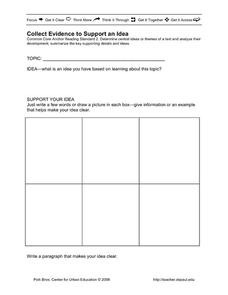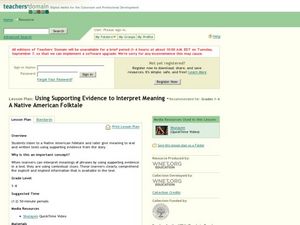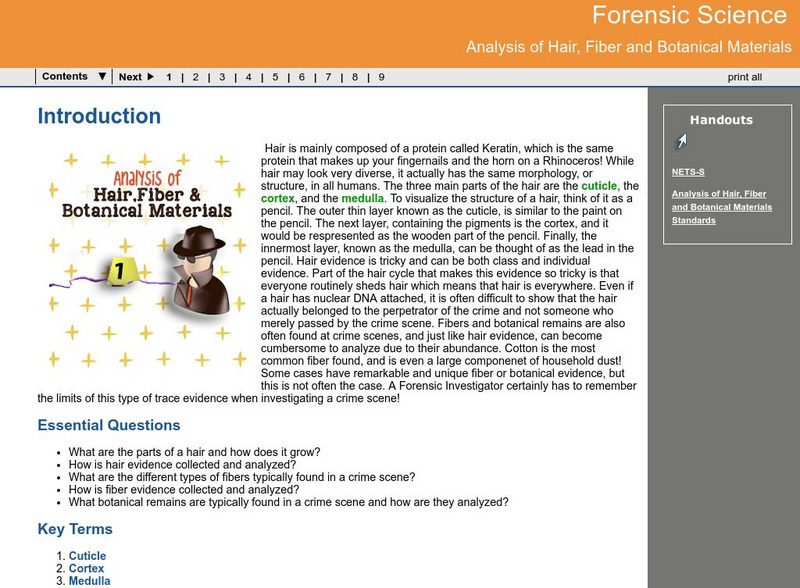Polk Bros Foundation
I Can Identify/Infer Motive
Why do people and characters act as they do? Require your class figure out the motivation of two people or characters they read about in a given text. In the short charts, pupils note down who, what they do, and why they do it. After...
Polk Bros Foundation
I Can Sequence Important Events
After reading any short informational or fictional text, ask your class to analyze the important events. They note down three important events on a short timeline, describing the events with either words or drawings. After this, pupils...
Polk Bros Foundation
I Can Analyze Cause and Effect
Examine cause and effect by asking pupils to fill out a basic graphic organizer. The template is for any story or event and provides a line for writing in the story or event title. Pupils write in two causes in the circles and the change...
Polk Bros Foundation
Collect Evidence to Support an Idea
In order to support an idea, writers must use evidence. Your class members can prepare their evidence with this basic worksheet. Writers note down the topic they are learning about and their own idea. Next, they come up with information...
Shmoop
ELA.CCSS.ELA-Literacy.W.9-10.9
Encourage your pupils to support their claims with textual evidence, whether is is from literary texts or informational texts. You might use the assignment example, which suggests an assignment on what it's like to be an immigrant in...
La Jolla High School
Of Mice and Men: Looking at Themes
Feelings of loneliness and alienation drive the characters in John Steinbeck's novel Of Mice and Men. Use this handout to set your class members up for a lesson on these big ideas. In addition to finding a couple of definitions and...
Curated OER
Anticipation Guides Improve Reading Comprehension
Beginning with anticipation guide strategies is a powerful method for improving reading comprehension. First, list initial ideas for a topic the class will be reading about. These ideas are formulated into statements, some of which are...
Curated OER
Michelle Kwan: Heart of a Champion
Who is a champion to your class? Elementary and middle schoolers think of a role-model from their lives. Then, in their journals, they write evidence of that person's perseverance. They identify the character trait of perseverance with...
Curated OER
Identifying Supporting Evidence from a Text - What is a Hero?
Pupils define hero and identify supporting evidence in a text. They complete a hero diagram worksheet and watch a video about a little boy from China who acts as a hero. Additionally, they complete the Ping Hero evidence worksheet and...
Curated OER
Main Idea/Supporting Details Scavenger Hunt
Engage your class in a scavenger hunt to find the main ideas and supporting details in a text. They follow the teacher while s/he models how to determine main idea and find supporting details, and then they work independently. A fun way...
Curated OER
Symbols and the Choices we Make
Upper elementary and middle schoolers recognize symbols that influence the choices that we make consciously or unconsciously in everyday life. They look at the symbols and choices that others make. They identify and apply knowledge of...
Curated OER
Lesson 3: Exception Questions in Stories with a Flashback
Fourth graders respond to a text using textual evidence to support their answers to questions. Students observe the teacher model a quick warm up on the chronological sequence of events from the passage, Leaving Home. In this literacy...
Curated OER
Little Boy Blue
First graders read nursery rhymes and celebrate Mother Goose. For this drawing conclusions and predicting lesson, 1st graders create new ending for the nursery rhymes. Students gather data and make a graph showing their favorite rhyme.
Curated OER
Murder Mystery
High schoolers examine how to capture foot prints while they simulate a criminal investigation. They discover how the clues are needed for identifying or eliminating murder suspects.
Curated OER
Children Cooking at Home: Developing Opinions
Excerpts from a New York Times article about children cooking dinner for their family can lead learners to express opinions about taking on real life responsibilities. The story will prompt discussion, but add more questions directed at...
Curated OER
Using Evidence to support Arguments
A directive on how to use evidence to support an argument, the text-heavy slides in this presentation define salient terms but offer few specific examples to illustrate concepts.
Curated OER
Using Supporting Evidence to Interpret Meaning-A Native American Folktale
Students read Native American folktales. In this multicultural literature lesson, students research the style of writing used in Native American folktales. They view a video of a folktale, and discuss the meanings of the creative...
Arizona State University
Asu: Chicana and Chicano Space
Provided by Arizona State University, this website is a comprehensive thematic, inquiry-based art education resource. Includes two interdisciplinary units of lessons.
PBS
Pbs Learning Media: Forensics and Dna Profiling
Find out how DNA profilers analyze bits of tissue to identify human remains. From the NOVA: "Lost on Everest" Web site.
PBS
Pbs Learning Media: How Dna Evidence Works
In this article by An Meeker-O'Connell, discover how DNA evidence is processed before it goes to court.
PBS
Pbs Learning Media: Forensic Dna Analysis
This video segment from NOVA: "The Killer's Trail" investigates the potential for DNA evidence to solve murder cases, even those from the distant past.
Georgia Department of Education
Ga Virtual Learning: Crime Science Investigation
In this comprehensive interactive tutorial you will learn the basic components of a crime scene investigation and how they are implemented. You will also learn various evidence collecting techniques, as well as how to properly document...
Georgia Department of Education
Ga Virtual Learning: Forensic Science: Analysis of Hair, Fiber and Botanical Mtl
This comprehensive interactive tutorial explores forensic science, particularly within the area of hair analysis. Investigate the parts of a hair and how it grows. Learn how is hair evidence is collected and analyzed and what different...
Georgia Department of Education
Ga Virtual Learning: Forensic Serology
In what ways does serological evidence help solve a crime? This comprehensive learning tutorial explores what information can be determined from a drop of blood and how blood typing is done. Learn what information we get from blood stain...























